Boat Safety Scheme - How to Get a Safety Certificate
You may be itching to buy a boat and take a trip through some of our beautiful UK inland waterways, but did you know that your boat will likely need a Boat Safety Certificate before you can get a licence to use certain UK waterways?
This guide will help you understand what the Boat Safety Scheme is, why it exists, and how you can get a certificate for your boat.
What is the Boat Safety Certificate and Boat Safety Scheme (BSS)?
The Boat Safety Certificate is a document that confirms that a boat complies with the safety standards outlined by the Boat Safety Scheme (BSS). The BSS is public safety initiative run by the Canal & River Trust, Environment Agency, Broads Authority, and the Association of Inland Navigation Authorities, and it’s designed to reduce the risk of boat-related incidents on UK inland waterways.
Just like your car needs an MOT certificate to use public roads, you need a valid Boat Safety Certificate to get a licence to use certain UK waterways. So, ensuring your boat meets these safety requirements is crucial for boat owners.
Why Does the BSS Scheme Exist?
The BSS scheme was created to protect boat owners and the environment. Its main goal is to reduce fire and explosion risks, fuel leaks, carbon monoxide poisoning, and pollution from boats. The scheme ensures all boats meet a specific set of safety standards covering everything from its gas appliances to the electrical systems.
Whether you’re thinking of buying a new or used boat, getting a Boat Safety Certificate will ensure your new pride and joy meets these crucial safety standards.
Do You Need a Boat Safety Certificate from the BSS?
Most boats that operate on UK inland waterways will need a valid Boat Safety Certificate to get a boating licence. This includes recreational and residential boats, as well as boats used for businesses. The only exceptions to this are boats without any gas, electrical, heating, or fuel systems, and you have to apply for an exemption certificate.
It’s also a good idea to check the specific requirements of any waterways you want to go on.
If you’re new to boating life, check out our All Things Boating section for lots of guides to boating essentials, such as how to buy a boat, residential living on a boat, and a beginner’s guide to boating.
What Does the Boat Safety Inspection Cover?
The BSS safety certificate inspection checks for a range of safety-related issues. Here’s a quick breakdown of what the BSS inspection typically covers:
Fuel Systems
- Fuel tanks and fuel supply systems must be free from leaks, corrosion, and damage.
- Fuel hoses and pipes must be in good condition and secure.
- Proper ventilation is required around fuel systems to stop harmful gases building up.
Gas Systems
- Gas appliances (like stoves and heaters) must be installed safely and properly ventilated
- Gas storage lockers need to be gas-tight to prevent leaks into the boat
- Gas cylinders should be securely stored, and gas pipework must be in good condition without leaks.
Electrical Systems
- Battery systems and electric wiring must be safely installed and insulated.
- Any electrical systems need to be protected from potential damage or short circuits.
- Fuses and circuit breakers should be correctly rated and in working condition.
Fire Safety Equipment
- Fire extinguishers must work and be readily accessible.
- Fire blankets (if applicable) should be installed and accessible
- Boats must have sufficient firefighting equipment for their size and the potential risks onboard.
Ventilation
- Good ventilation for fuel and gas systems to reduce fire and explosion risk.
- Boats need enough airflow to prevent carbon monoxide buildup.
Exhaust and Engine Systems
- Engine exhausts must be safe, secure, and free from leaks.
- The fuel supply, ignition, and electrical systems must be safe.
Appliances and Systems
- All systems including cooking and heating appliances, must be correctly installed and properly maintained.
- Appliances must not present a fire or explosion risk.
Safety Alarms
- Carbon monoxide detectors are recommended. They need to be fitted and working, especially in boats with gas appliances or enclosed engine spaces.
- Smoke alarms are recommended.
Flammable Materials
- Any materials like fuels, paints, or solvents, should be correctly stored to reduce the risk of fire or explosion.
- The boat shouldn’t have too many easily flammable materials in the living or engine spaces.
Overall Safety
- The general condition of the boat is checked, including the structural integrity of key components.
- Emergency exits and safety procedures are also assessed to ensure people can safely evacuate if needed.
Waterways
The BSS applies to a range of waterways in England and Wales, managed by the Canal & River Trust and also several privately-owned waterways.
In Scotland, the rules are different. The BSS is generally not required for most waterways. Instead, Scotland has its own set of regulations depending on who manages the waterway. For example:
- For Scottish canals managed by Scottish Canals, a BSS is not typically required in the same way as England and Wales. However, they still have safety requirements that boat owners must comply with, although they may be different from BSS ones.
- Lochs and other bodies of water may have their own safety guidelines depending on the region and governing authority.
If you’re planning on boating in Scotland, it’s crucial to check with the relevant waterway authority (like Scottish Canals) to make sure your boat meets the safety standards for those waters.
Boat Types
Boats that need a BSS certificate include:
- Narrowboats
- Wide-beam boats
- Cruisers
- Houseboats
- Leisure boats
If you’re not sure whether your boat needs a BSS certificate, it’s always best to check with the Boat Safety Scheme or your licensing authority.
How Much Does a BSS Certificate Cost?
The cost of a BSS certificate varies depending on the examiner and the type of boat the certificate is for. An average cost is around £150 to £200 for an initial inspection, and it’s a good idea to shop around for an authorised examiner, as prices may vary.
How Long Does a Boat Safety Certificate Last?
Although the cost of a BSS certificate may seem a little steep, it’s valid for four years. During that four years, you must make sure all safety equipment and systems are kept in good working order.
If you’re planning on buying a used boat, it’s a good idea to check that it has a BSS certificate, and how long it will be before it needs renewing.
If you make any big alterations to your boat within that four years, such as changing the fuel system or upgrading appliances, you may need to have your boat inspected again.
How to Apply for a BSS Certificate?
Getting a boat safety certificate may seem daunting, but it’s actually quite straightforward. Here’s how to do it:
- Find an authorised examiner: Look for a qualified BSS examiner through the official Boat Safety Scheme website, or ask for recommendations from other boat owners.
- Book an inspection: Once you’ve chosen an examiner, arrange for them to inspect your boat.
- Prepare your boat: Follow the BSS website’s guide and checklist for making sure your boat is ready for inspection.
- Get inspected: The examiner will assess your boat to ensure it meets the BSS standards.
- Receive your certificate: If your boat passes the inspection, you’ll get your certificate. If there are any issues identified, you’ll need to fix these before reapplying.
For more detailed guidance, visit the Boat Safety Scheme website above.




